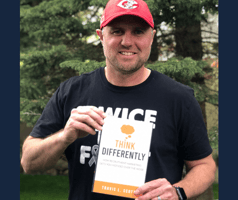Concerned About Being Too Old to Change Careers? Stop Agonizing Over This and Start Now

How Old is Too Old to Change Careers?
This is a question that a lot of people ask. Instead, I would ask myself, “why do I want to change careers?”
What is it about what you’re doing now that isn’t satisfying, or isn’t the path you want to be on?
Do you feel like your values are misaligned with the industry you’re in? Are you not challenged enough? Not learning enough? Do you think that your current career path wasn’t your decision?
Stop Focusing on Outcomes
If you’re wondering about your age because you realize it will take time to build up expertise and start to see some forward momentum, then that’s a valid consideration. It will take time.
But is there actually an outcome you’re seeking? Is there an end to your journey, a point in time when you say, “that’s it, I’ve done what I can do here, and there’s nothing more to do”?
Does that exist with your current career trajectory?
Probably not. There’s always more to learn. There are still new edges to explore. It’s no different in the new career path you’re considering.
So, stop focusing on some imaginary outcome. Stop comparing yourself to other people who have been doing it longer than you, and start focusing on the journey you’re about to embark on.
Focus on the opportunity of having something new to explore. The opportunities to form a new network of people, push yourself, and continue to grow.
Life is too short to be doing something every day that makes you unhappy or unfulfilled.
When you’re on your death bed, will you regret not trying something different when you had the chance?
Money is an Accepted Excuse
Money is often the biggest excuse we make for ourselves. When you tell people you decided not to try something else because you didn’t want to take a step back financially, people understand.
It’s an easy out.
You convince yourself that there’s no way you could make it work financially. You have a mortgage, kids, car payments, college tuition to save up for, and on and on and on.
Money is a convenient place to hide because others will support your decision not to leap.
It makes sense to everyone, including you.
The problem with this is it’s precisely that—an excuse.
There are no rules to making a career change. You don’t have to quit your job one day and start your new career the next.
If you think you can simply apply to the jobs that align with your career change with no experience to back up your application, you’re going to be spending a lot of time applying and will end up very disappointed.
That’s not how career changes happen.
One of the best ways to make a career change is to try different things in your free time while you have a full-time job.
This takes away the pressure of needing to find a role to match your current income. It also gives you the ability to try different things.
One thing to ask yourself is, “could I do the thing I’m hoping to pivot toward for a non-profit?”
If the answer is ‘yes,’ then stop applying to jobs and start looking for non-profits who would love if you volunteered your time to help them. Even if you are still learning, they are usually willing to let you help since it doesn’t cost them anything, and you likely already know more than they do about whatever it is you’re offering to help with.
Start small and grow from there. You may also find out that you don’t really like it as much as you thought you would. Now you’re free to explore something else.
Become Curious (Again)
When we were children, we were curious about nearly everything. We wanted to know how the world around us worked. We asked questions, especially “why.”
Somewhere along the way, we lost our curiosity. Now that you’re considering a career change, you’ve likely gotten a bit of that curiosity back. But, now, you are worried about being judged for what you don’t know.
Somehow, the voice in your head, your “lizard brain,” tells you to give it up. That you don’t know enough. That people will think you’re a fraud, and you’ll never be able to ‘fake it ‘til you make it.’
Your pride begins to get in the way. You’ve likely spent 10, 20, maybe 30 years in the same industry and career. You know quite a bit, but I bet you’re no expert, even after spending that much time in the field.
This is where a lot of people get hung up. For some reason, they think they can change careers and instantly know as much as people who have been doing it for 10 or even 5 years.
Stop limiting yourself. In my experience with changing careers, this was probably the most fun part of the entire experience: digging in and learning everything and anything I could.
I’m still learning, 10-plus years after I decided to make a change.
The same is true of the people you’re comparing yourself to.
The thing to remember, everyone started where you are. They actually started with less experience because you have years of professional experience, coupled with the unique perspective of being in a different career and industry.
This is a significant advantage. You’re able to bring insight and ideas to the table that no one in your new career field may have.
Basically, it all comes down to giving yourself permission to explore, learn, and take the first step toward changing your career trajectory.
Stop focusing on an outcome that likely doesn’t exist. Instead, focus on the journey and how much fun you’ll have along the way. How much more alive you’ll feel. How much happier you will be.
Stop hiding.
Just start. Today. Tomorrow you’ll know more than today. Next month even more. A year from now? You won’t even recognize how much you know about your new field.
You don’t have to make a giant leap. Just one small step forward. That’s it.
Most of all, stop comparing yourself to others.
Photo by lee Scott on Unsplash
</div<></figure</div
-1.png?width=400&height=100&name=Website%20Logo%20-%20400x100%20(transparent%20background)-1.png)


